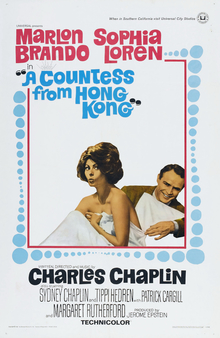
Back A Countess from Hong Kong AN كونتيسة من هونغ كونغ (فيلم) Arabic كونتيسه من هونج كونج ARZ আ কাউন্টেস ফ্রম হংকং Bengali/Bangla La comtessa de Hong Kong Catalan A Countess From Hong Kong Welsh Die Gräfin von Hongkong German Η Κόμισσα από το Χονγκ Κονγκ Greek A Countess from Hong Kong Esperanto A Countess from Hong Kong Spanish
| A Countess from Hong Kong | |
|---|---|
 Theatrical release poster | |
| Directed by | Charlie Chaplin |
| Written by | Charlie Chaplin |
| Produced by |
|
| Starring | |
| Cinematography | Arthur Ibbetson |
| Edited by | Gordon Hales |
| Music by | Charlie Chaplin |
Production company | |
| Distributed by |
|
Release date |
|
Running time | 107 minutes |
| Country | United Kingdom |
| Language | English |
| Budget | $3.5 million (estimated)[1] |
| Box office | $1.1 million (United States and Canada Rentals)[2] |
A Countess from Hong Kong is a 1967 British romantic comedy film scored, written, and directed by Charlie Chaplin, and the final film directed, written, produced and scored by him. Based on the life of a former Russian aristocrat,[3] as he calls her in his 1922 book My Trip Abroad. She was a Russian singer and dancer who "was a stateless person marooned in France without a passport."[4] The film starred Marlon Brando and Sophia Loren, and revolved around an American diplomat who falls in love with a stowaway on a cruise. Sydney Chaplin (Chaplin's son), Tippi Hedren, Patrick Cargill and Margaret Rutherford co-star in major supporting roles; Chaplin also made a cameo, marking his final screen appearance.
The story is based loosely on Russian singer and dancer Moussia "Skaya" Sodskaya, whom Chaplin met in France in 1921.[3] The film had been in development since the 1930s under the title Stowaway, as a vehicle for Paulette Goddard.[5] However, following their divorce and subsequent events in his life, Chaplin continued working on it until it was ready for production in the mid-1960s. It was ultimately his only film in colour, and one of two films Chaplin directed in which he did not play a major role (the other being 1923's A Woman of Paris).
The film premiered in London on 5 January 1967, receiving negative reviews from critics. Although a major success in Europe and Japan, it still underperformed at the US box office, though the success of the music score - which Chaplin worked on with Lambert Williamson - was able to cover the budget. The film's theme song, "This Is My Song", written by Chaplin and performed by Petula Clark, became a worldwide success, topping the charts in the United Kingdom, Ireland, Australia, the Netherlands and Belgium, while reaching number three in the United States and number four in Canada. Since its release, the film has been reevaluated and received more positive reviews.
- ^ Alexander Walker, Hollywood, England, Stein and Day, 1974 p345
- ^ "Big Rental Films of 1967". Variety. 3 January 1968. p. 25. Please note these figures refer to rentals accruing to the distributors.
- ^ a b Charlie, Chaplin (1922). My Trip Abroad. Harper & Brothers. p. 127. Retrieved 11 October 2010.
- ^ Milton, Joyce (1996). Tramp: The Life of Charlie Chaplin. Da Capo Press. pp. 192, 356. ISBN 0-306-80831-5.
- ^ "Charlie Chaplin : Overview of His Life". Charlie Chaplin: Official Site. Archived from the original on 4 September 2011. Retrieved 14 March 2016.
© MMXXIII Rich X Search. We shall prevail. All rights reserved. Rich X Search